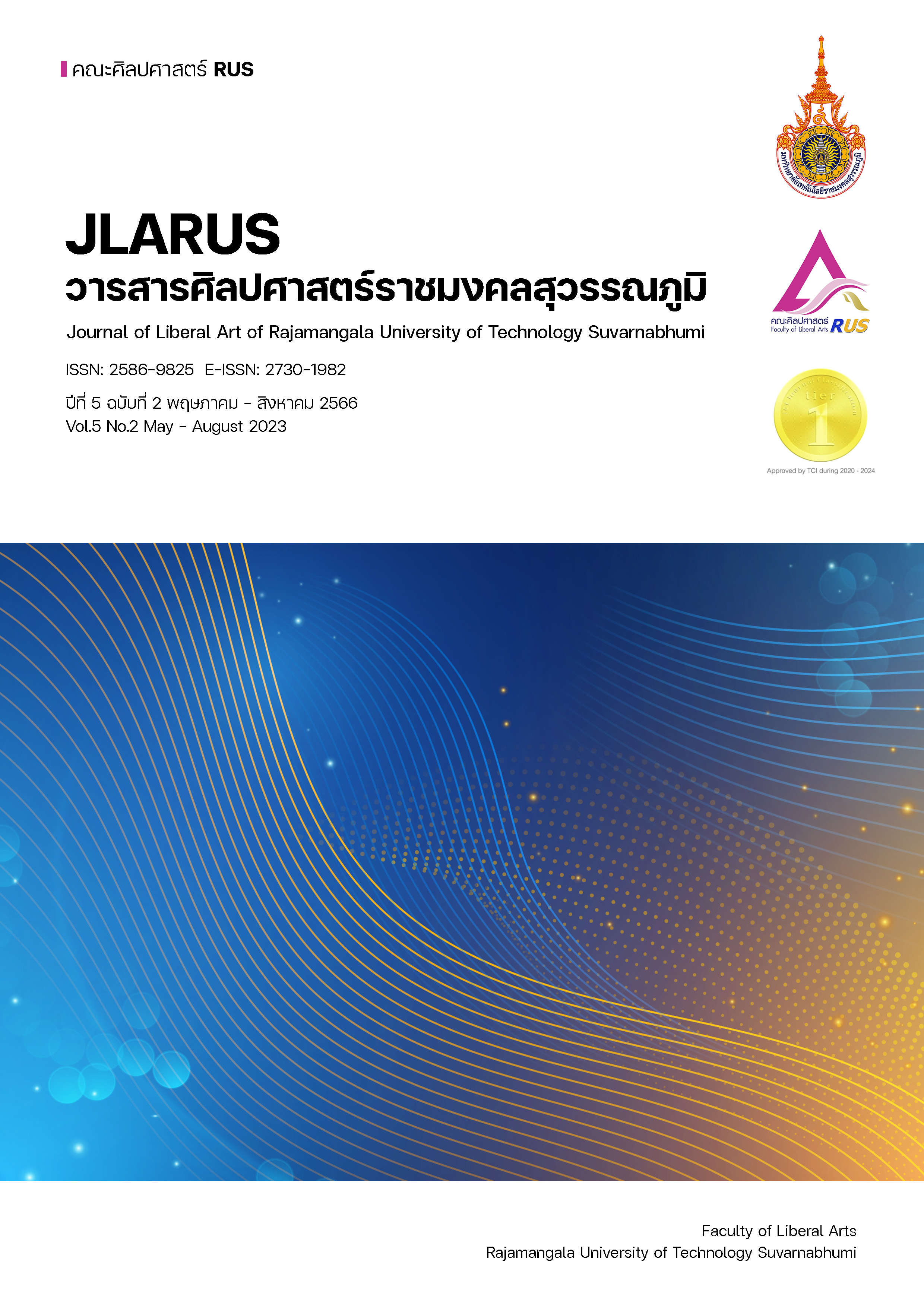SUPPLY CHAIN OF FOOD TOURISM IN THAILAND AFTER THE COVID - 19 CRISIS
Main Article Content
Abstract
The researchers studied Thailand’s Food Tourism Supply Chain after the COVID-19 crisis. It studied Supply Chain Management and the Relationship Between Food Tourism and Tourism Activities. The involvement from the Origin of Raw Materials until Goods Delivery and Services to Tourists. Since the food represents the uniqueness of the community in the local area. Additionally, the way of life within the culture of the country. The objectives of this academic article were to suggest guidelines for promoting Food Tourism Supply Chains in Thailand. The Author searched and studied information from relevant research papers. The studies consisted of content analysis and descriptive results synthesis. It was found that the Supply Chain of Food Tourism in Thailand is a starter of Source Producers, including farmers, gardeners, and food and drink processors. The products were passed via intermediaries of local entrepreneurs. The data gained can be food history and valuable information for investors. It linked four facets of the food tourism activity: 1. Street Food and Food Markets, 2. Food Festivals and Food Exhibitions, 3. Food Tours, Farm Tours, and Health Tours, 4. Cooking Classes and Cooking Competitions, and relationships with official Sponsors, including Government agencies and the private sector that supports the venues, logistics and transportation companies, tours companies, and accommodation establishments.
Article Details

This work is licensed under a Creative Commons Attribution-NonCommercial-NoDerivatives 4.0 International License.
References
การท่องเที่ยวแห่งประเทศไทย. (2560). Foodie Experience Food will Keep Us Alive. กรุงเทพมหานคร: TAT Review.
ธง คำเกิด และวัชรพันธ์ แสนสิทธิ์. (2562) แนวทางการพัฒนาการท่องเที่ยวโดยชุมชน บ้านบางแม่หม้าย ตาบลบางใหญ่ อำเภอบางปลาม้า จังหวัดสุพรรณบุรี. วารสารศิลปศาสตร์ราชมงคลสุวรรณภูมิ. 1(3). 221-232.
เบญจมาภรณ์ ชำนาญฉา. (2561). การท่องเที่ยวเชิงอาหาร: ศักยภาพและความได้เปรียบของประเทศไทย. วารสารสมาคมสถาบันอุดมศึกษาเอกชนแห่งประเทศไทย ในพระราชูปถัมภ์ สมเด็จพระเทพรัตนราชสุดาฯ สยามบรมราชกุมารี. 24(1), 103-116.
ประชาชาติธุรกิจ. (2562). Gastronomy Tourism กระจายรายได้สู่ “ฐานราก”. สืบค้น 1 สิงหาคม2565. จาก https://www.prachachat.net/tourism/news-317059.
กรมการท่องเที่ยว. (2560). ยุทธศาสตร์กระทรวงการท่องเที่ยวและกีฬา พ.ศ. 2560–2564. สืบค้น 1 สิงหาคม 2565. จาก https://www.mots.go.th/news/category/66.
วุฒิชัย กฤษณะประกรกิจ. (2560). Foodie Food Tourism Trend 2017. สืบค้น 2 สิงหาคม 2565. จาก http://etatjournal.com/web/menu-read-tat/menu-2017/menu-12017/756-12017-foodie.
ศูนย์ธุรกิจกสิกรไทย. (2561). เทรนด์ท่องเที่ยวดี SME รีบคว้าโอกาส. สืบค้น 5 สิงหาคม 2565. จาก https://www.kasikornbank.com/th/business/sme/KSMEKnowledge.
ศูนย์วิจัยด้านตลาดการท่องเที่ยว. (2565). TAT คาดการณ์แนวโน้มสถานการณ์ท่องเที่ยว. การท่องเที่ยวแห่งประเทศไทย. สืบค้น 2 สิงหาคม 2565. จาก https://intelligencecenter. tat.or.th/articles/22978.
ศิริพร เลิศยิ่งยศ, ศิริสรณ์เจริญ กมลลิ้มสกุล และ กนก บุญศักดิ์. (2563). การจัดการโซ่อุปทานเพื่อพัฒนาการท่องเที่ยวเขตพัฒนาการท่องเที่ยวอารยธรรมอีสานใต้. วารสารวิชาการมหาวิทยาลัยหอการค้าไทย มนุษยศาสตร์และสังคมศาสตร์. 40(4), 120-139.
สุปรียา ภูผาลา และ จารุวรรณ แดงบุบผา. (2565). การพัฒนารูปแบบการท่องเที่ยวเชิงอาหารโดยชุมชนในประเทศไทย.วารสารวิชาการสถาบันเทคโนโลยีแห่งสุวรรณภูมิ. 8(1), 286–304.
อัตตนาถ ยกขุน ,ชนกนารถ ราชภักดี และธนิสร พิตรชญารมย์ (2563) แนวทางการพัฒนาการท่องเที่ยวเชิงอาหารในประเทศไทย. วารสารวิชาการมหาวิทยาลัยอีสเทิร์นเอเชียฉบับสังคมศาสตร์และมนุษยศาสตร์, 10(1), 60-68.
Almaz, S. (2018). The Impact of Street and Food Festivals in Gastronomic Tourism through Visitor’s Emotions and Satisfaction. A Case of Abu Dhabi Food Festival International. Journal of Research in Tourism and Hospitality (IJRTH). 4(1), 27-32.
Kim, S. Park, E. Fu, Y. and Jiang, F. (2021). The Cognitive development of Food tasteperception in a food tourism destination: A gastrophysics approach. Appetite 165, 1-11.
Nilgumhaeng, R., Sattayanuchit, W. and Pansukkum, S. (2020). The Concept of Using theLocal Identity for Tourism Promotion in Nakhon Ratchasima Province (Khorat), Thailand. Proceeding of The 2nd China-ASEAN International Conference 2020and The 2nd International Conference on Tourism, Business, & Social Sciences 2020. Inspiring to Chinese and Asian’s Wellness tourism & Innovation. 758–775. Bangkok: Dhurakij Pundit University. สืบค้น 1 สิงหาคม 2565 จาก https://www.researchgate.net/publication/357648531.
Park, W. (2022). Food tourism experience and changing destination foodscape: Anexploratory study of an emerging food destination. Tourism Management. สืบค้น 2 สิงหาคม 2565. จาก www.elsevier.com/locate/tmp.
World food Travel Association. (2019). The World's leading Authority on food & beverage tourism. สืบค้น 2 สิงหาคม 2565. จาก https://worldfoodtravel.org/.
World Tourism Organization. (2021). 6th UNWTO. world forum on gastronomy tourism. สืบค้น 20 สิงหาคม 2565. จาก https://www.unwto.org/6th-unwto-world-forum-on-gastronomy-tourism.
Work Point Today. (2564). ท่องเที่ยวจะไม่เหมือนเดิมอีกต่อไป’คุยเรื่องท่องเที่ยวไทยในโลกหลังโควิดกับผู้ว่าการท่องเที่ยวแห่งประเทศไทย. สืบค้น 2 สิงหาคม 2565. จาก https://workpointtoday.com/kkp-research-gdp-2021/.
Yuan, S. (2015). Reflections on Local Specialties and Gastronomic Tourism. Scientific Research Publishing. สืบค้น 5 สิงหาคม 2565. จาก http://www.scirp.org/journal/ chnstdhttp://dx.doi.org/10.4236/chnstd.2015.41003.
Zhang X., Song H., & Huang GQ. (2009). Tourism Supply Chain Management: A new Research Agenda. Tourism Management, 30(3), 345-358.


